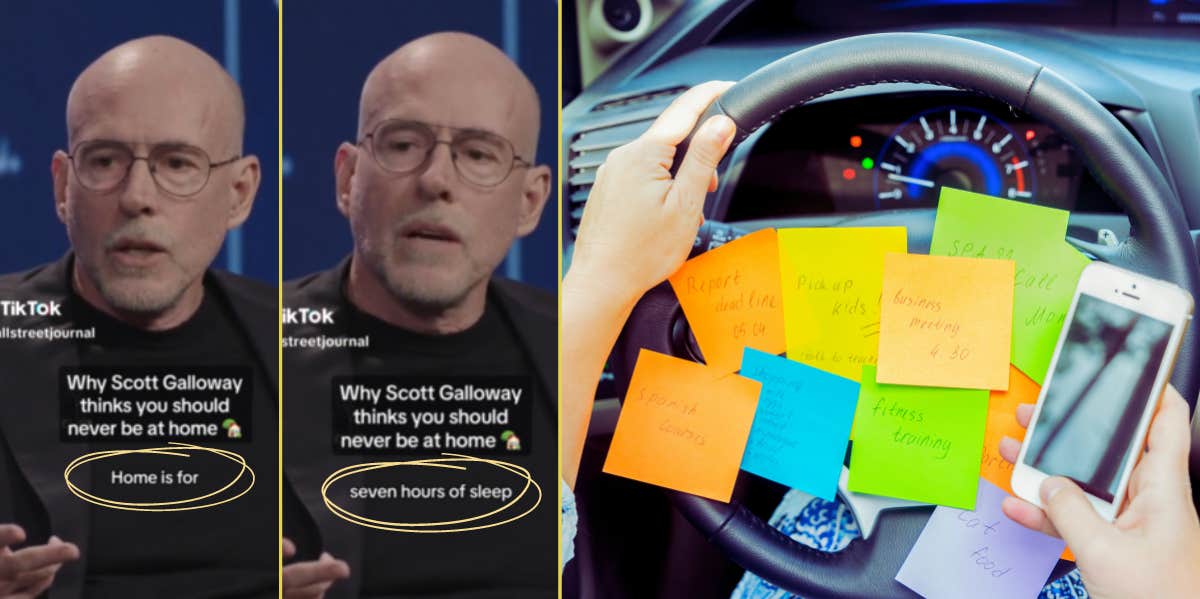Professor Argues That 'You Should Never Be At Home' If You Want To Succeed
Home is for sleeping seven hours and nothing more.
 @Wallstreetjournal / TikTok & Neirfy / Shutterstock
@Wallstreetjournal / TikTok & Neirfy / Shutterstock With everyone striving for work/life balance, having downtime is vital. But according to Scott Galloway, an NYU marketing professor, and the host of his own podcast, being away from the job doesn’t necessarily mean you should be relaxing at home.
In a TikTok video clip uploaded to the Wall Street Journal’s account, Galloway starts by saying, 'You should never be at home. That’s what I tell young people.'
The professor goes on to say that home should only be used to get seven hours of sleep. According to him, the amount of time that you spend at home is “inversely correlated” with how successful you are in the professional and romantic realm. “You need to be out of the house,” said Galloway.
RELATED: CEO Pens LinkedIn Post Telling Employers To 'Never Hire Anyone That's Looking For Work-Life Balance'
 Photo: TikTok
Photo: TikTok
Being in the comfort of your own home is important for your overall well-being.
If you’re like many people, home is a refuge away from the worries of the world—a safe space where you can let your guard down and be yourself. At home, you can spend time with people you love, stay connected, cook great meals, prioritize your mental, physical, and emotional health, and save money. Those are things that are beneficial for your overall wellness. But does that self-care time equate to professional success and an active love life?
Putting in more time at work doesn’t necessarily equate to being more successful there.
From a professional standpoint, some believe that the more time you put in, the more likely you are to achieve success, while others think that they should be working smarter, not harder.
According to research, productivity at work drops after 50 hours of work per week and is almost nonexistent at 55. As a matter of fact, people who work 70 hours in a week are no more productive than those who put in 55 hours, according to a study conducted by John Perncavel of Stanford University.
Professional success is tied to what you do both on and off the clock.
Galloway never said you should spend all of your time at work, but he was likely alluding to doing things that grow you professionally while working and during your ‘off’ hours. Some of the ways that can help you develop and increase your chances of success are:
- Take in-person and online training courses.
- Find a mentor.
- Network regularly.
- Join a professional organization.
- Set short and long-term S.M.A.R.T. goals.
- Volunteer frequently.
- Build your reputation by branding yourself.
- Read books in your area of expertise.
- Take calculated risks.
- Know your purpose and have a vision.
- Practice self-care.
Some of those professional development activities can be done from the comfort of your own home, but others will require you to get out into the world and make meaningful connections with other people. If no one knows who you are, who can attest to your expertise and reliability? When the right opportunity comes up will you be ready?
Working on yourself and your skills should not be limited to what you are paid to do but should encompass finding your own opportunities and resources. But your free time should be structured for maximum impact and time management.
Getting outside the house to meet new friends can enrich your life and improve your health. That social interaction can stave off isolation and loneliness, while also giving you a chance at companionship, platonic or romantic. It also gives you a sense of belonging and purpose, boosts happiness, reduces stress, increases confidence, and helps you through trauma.
So, while Galloway’s words seem jarring at first, if you add context and dive a little deeper, you will find that there are many benefits to getting out of the house and exploring the world. People make the world go round and you need people to succeed in your professional and romantic life, so be open and strategic by putting yourself out there.
RELATED: Stop Living To Work: How To Embrace A True Work-Life Balance, According To A CEO
NyRee Ausler is a writer and author from Seattle. She covers issues navigating the workplace using the experience garnered over two decades of working in Human Resources & Diversity, Equity, and Inclusion.

